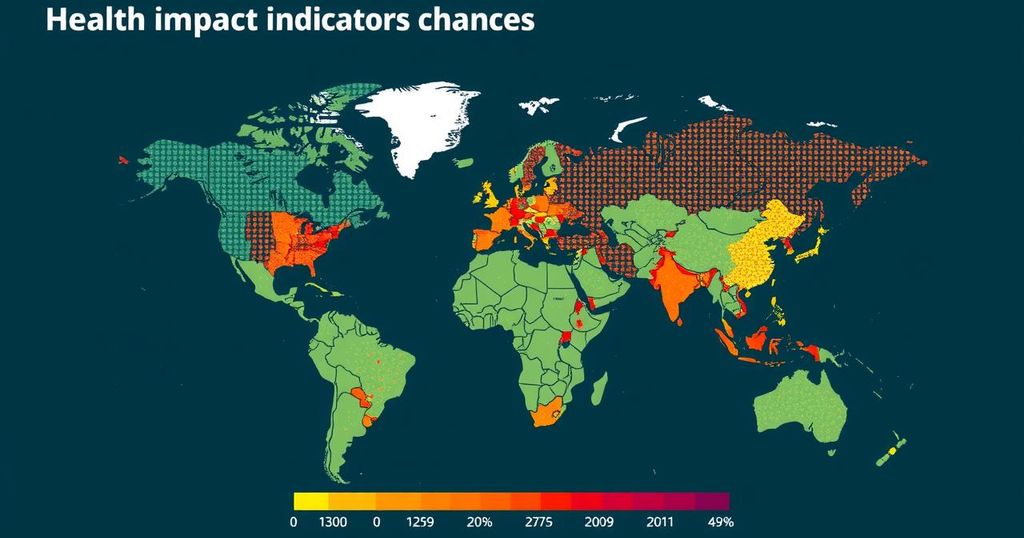Climate Change: Unprecedented Threats to Global Health Revealed
A new report highlights the dire consequences of climate change on human health, indicating record threats including extreme weather events, increased mortality among the elderly, the spread of infectious diseases, and worsening food insecurity. Released ahead of significant climate summits and elections, the report emphasizes the urgent need for action to combat these escalating health risks.
Recent findings reveal that climate change is posing unprecedented threats to global health, as highlighted in a significant report released this week. The document emphasizes that ignored warnings have resulted in catastrophic consequences for human lives. With the world bracing for what is projected to be the hottest year on record, extreme weather phenomena—including heat waves, wildfires, hurricanes, droughts, and floods—have intensified. The report emerges at a critical juncture, just ahead of the 29th United Nations Climate Change Conference (COP29) in Azerbaijan and preceding a United States election that could result in the return of climate change skeptic Donald Trump to the presidency. The eighth edition of the Lancet Countdown on health and climate change, compiled by a coalition of 122 experts, including those from the World Health Organization, presents a stark account of the deteriorating public health situation in the face of climate dynamics. Out of a total of 15 specific indicators monitored over the past eight years, alarming records were noted for 10 of these metrics. This alarming trend includes escalating instances of extreme weather events, rising mortality rates among the elderly due to heatwaves, the increasing distribution of infectious diseases, and heightened food insecurity resulting from crop devastation amidst droughts and floods. Marina Romanello, the Executive Director of the Lancet Countdown, informed Agence France-Presse (AFP) that the report illustrated “record threats to the health and survival of people in every country, to levels we have never seen before.” The report indicates a staggering 167 percent increase in deaths among the population aged 65 and older due to heat exposure since the 1990s. Furthermore, the geographical areas hospitable to mosquitoes have expanded, thereby facilitating the transmission of dangerous diseases. Notably, the previous year marked a record high of over 5 million dengue cases worldwide. From 2016 to 2022, approximately five percent of the planet’s tree cover was lost, diminishing the Earth’s ability to absorb carbon dioxide emissions. Additionally, the report scrutinizes the complicity of oil and gas sectors, alongside certain governments and financial institutions, in exacerbating climate issues by escalating fossil fuel production. Despite long-standing warnings regarding environmental sustainability, global emissions of major greenhouse gases increased once again last year, as reported by the World Meteorological Organization. Meanwhile, significant profits in the oil and gas industries have led to heightened fossil fuel extraction since the previous year, with many nations issuing new subsidies for fossil fuels in response to rising energy costs following Russia’s invasion of Ukraine in February 2022.
The impact of climate change extends far beyond environmental challenges, fundamentally affecting human health and safety. The Lancet Countdown is an initiative aimed at tracking the link between health and climate change, aggregating data and expert analyses to inform global policy and health strategies. Over the years, increasing temperature trends have correlated with health risks, including heat-related maladies, the spread of infectious diseases, and food security challenges. This report serves as a wake-up call regarding the urgency of addressing climate change and its direct implications for public health.
The recently released report by the Lancet Countdown underscores critical health concerns stemming from climate change, revealing record-breaking impacts on global health that have dire consequences for populations worldwide. The findings illustrate the necessity for immediate and decisive action to mitigate these trends, particularly in the lead-up to significant climate negotiations and amidst ongoing geopolitical challenges affecting the energy landscape.
Original Source: www.manilatimes.net




Post Comment